Research Project
That
last two weeks have been busy at the hospital treating patients and going out
for outreach to draw blood on our kids in our research project. Many of you have asked about the research and
so I am going to give you a short summary that was written by one of the
researchers:
Community Based Antiretroviral Therapy (CBART)
Project
At
Chidamoyo Christian Hospital- Hurungwe
District, Mashonaland West Province
Implemented by Biomedical Research and Training Institute
(BRTI)
February 2018-January 2020
-------------------------------------------------------------------------------------------------------------------------
The
Biomedical Research and Training Institute (BRTI) is a not-for-profit making
research and training institution founded in 1995 to promote the health and
quality of life of the peoples of Africa through research and training in the
field of biomedicine. Zimbabwe, like other Member States of Southern Africa
Development Community (SADC), adopted the 2013 WHO HIV treatment guidelines, which
include HIV viral load (VL) monitoring for people receiving antiretroviral therapy
(ART). VL indicate how well a person is responding to the HIV medicine (ART). However,
Zimbabwe only has viral load monitoring equipment at provincial hospitals yet
would like to ensure that 90% of all people on ART to have the HIV medicines
suppress the HIV to undetectable levels in their blood. Studies that have been
conducted in the region as well as in the country have shown that maintaining undetectable
viral load among adolescents is more difficult than in other age groups. It is
against this background that BRTI health research scientists, Dr Junior Mutsvangwa,
Dr Shungu Munyati and Dr Justen Manasa with assistance from Prof David
Katzenstein, applied for and received funding from Gilead – an American
pharmaceutical company, to conduct a research project whose aim is to reduce virologic failure rates among
children and adolescents who are on antiretroviral therapy (ART).
The project is being conducted at Chidamoyo Hospital
in Hurungwe District of Mashonaland West Province and is divided into two broad
components: (i) laboratory and (ii) ethnography. The first component
(laboratory) seeks to monitor virological failure, drug resistance and toxicity
on the target population using mobile health technologies. The second component
(ethnography) hopes to find out community factors that help or hinder treatment
adherence. After seeking clearance from the Medical Research Council of
Zimbabwe (MRCZ) BRTI investigators have started working with both Chidamoyo
Hospital and Chinhoyi Provincial Laboratories. Highlights of the project
interventions include the following activities:
a)
digital data collection and near point
of care Viral Load monitoring
b)
lower cost test for HIV drug resistance
(genotyping) for individuals with persistently high Viral Load
Project Benefits to the community
i.
The project avails HIV diagnostics that capture electronic records of laboratory
tests, and provides mobile collection of patient information, enable electronic
tracking of blood samples, linkage to care, treatment(s) and viral load
differentiated care. These interventions take advantage of the unique
functionality of mobile and wireless devices. Data is captured on Tablets or
smart-phones at the point of care in dispersed rural communities and can use
compressed 3G cell phone connections to relay and update patient data. Real
time acquisition of patient data, rapid transmission of aggregated/summary data
to district and provincial level managers of ART programs, will be achieved
despite limited broadband capability at the point of care. This facilitates
near real-time data collection to provide feedback and digital records to the
pharmacy, laboratory and clinical services to achieve and maintain virologic
suppression by assessment of VL differentiated care and switching to more
effective regimens in a community setting – drug resistance or drug toxicity is
detected and managed earlier.
ii.
Chidamoyo Hospital is one of the few health facilities in the country
which offers Community based ART – a situation where a health facility reaches
out to the community with HIV testing and treatment facilities. This approach reduces stigma and
discrimination among people living with HIV. As the adolescents and children are
enrolled and take part in the project, there is peer to peer support to adhere
to ART. The project activities also strengthen and ensure family and community
support for people infected and affected by HIV.
Sustainability
Modern
biomedical research, training, public health institutions and health service
providers are increasingly using digital communication and new on-line and
digital tools to address the HIV and TB epidemics. These new methods to monitor
responses to ART will enhance the effectiveness of community-based adherence
interventions and appropriate treatment switches to maintain virologic
suppression.
As
the project is implemented, there will be capacity building of staff and
facilities at Chidamoyo and the Provincial Hospitals and these skills and
equipment will remain in the province after the life span of the project.
The ethnography component of the
project involves interaction with Village Health Workers and community leaders (political,
religious and traditional leaders) who will always be part of the community and
will continue the supportive role long after the project.
Hope this explains what we are doing and
the work we are in now is visiting our 8 outreach clinis to draw blood on or 21’s
and under kids. We think this will be a
big help in treating or kids, kids in Zimbabwe and throughout the world. We have already drawn 135 kids and hope to have 600+ kids on the program.
On Friday morning we were happy to see a container that had been sent at the end of October from CA arrive. We are so happy and can't wait to have the time to unload it. This really helps our patients to get a lot of their supplies free. We are so thankful for our many people who help collect things and take them to Gene and Sue Beckstead and for their great help in collecting and sorting everything and putting it in the container and getting it sent. Thank you to all of you!
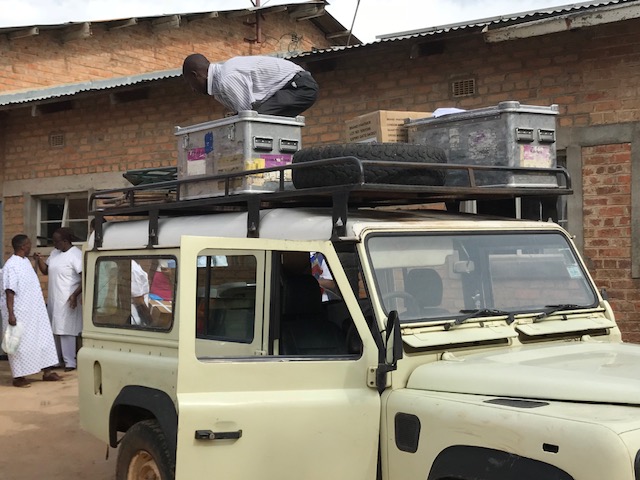
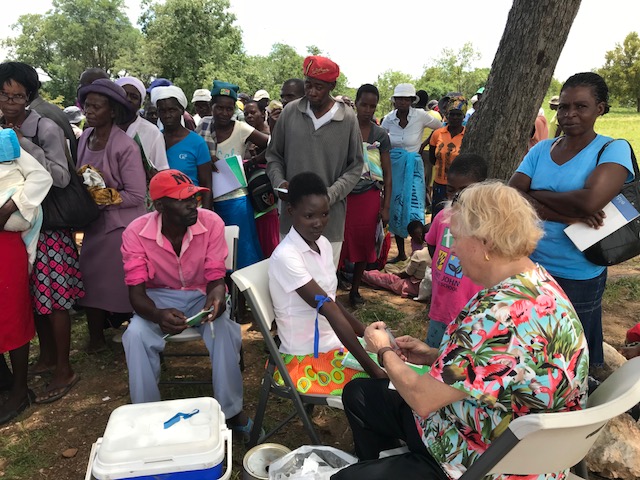
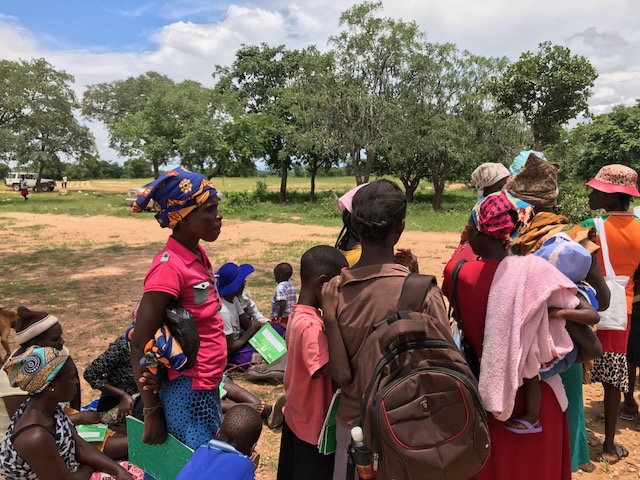








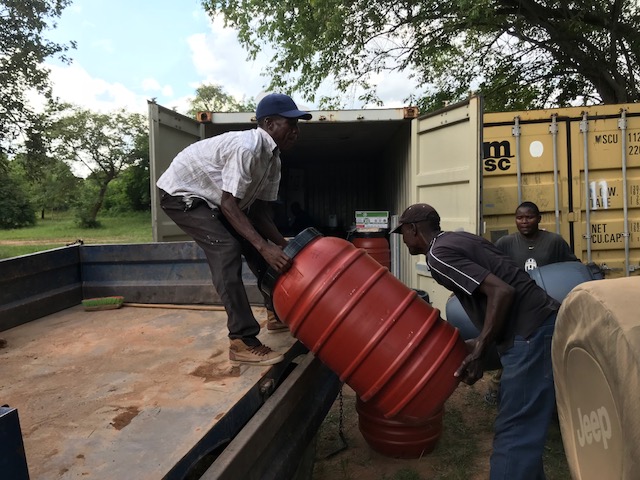
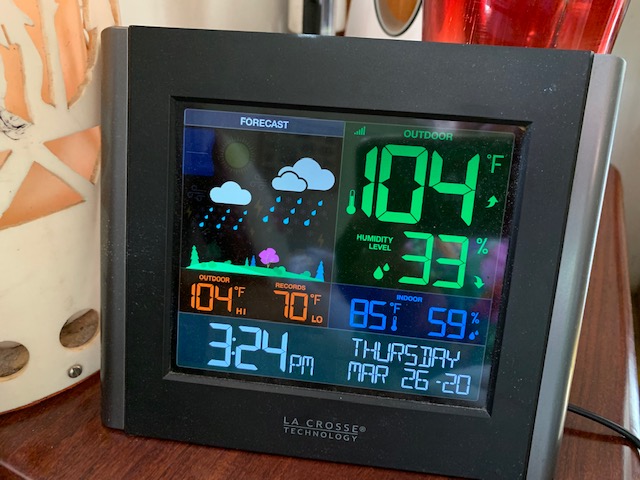
Your website is very beautiful or Articles. I love it thank you for sharing for everyone. Mobile Blood Draw Program
ReplyDelete